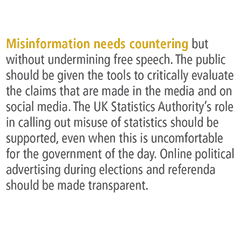 The RSS Data Manifesto sets out ten recommendations to the UK government on how it can improve data for the good of society.
The RSS Data Manifesto sets out ten recommendations to the UK government on how it can improve data for the good of society.
Will Moy, chief executive of fact checking organisation Full Fact, explains how we might address recommendation number 8: Misinformation needs countering.
The growth of untrustworthy, false and misleading content is a problem that cannot be ignored. It threatens public debate, public trust and even public health. Faced with more information than ever before, it’s harder to tell what’s true from what’s not. This means it’s crucial that there are sources of reliable information that people can use to inform their decisions.
At the same time, as the Royal Statistical Society’s manifesto rightly points out, efforts to stem the flood must tread a fine line: protecting people from bad information must not damage everyone’s right to free speech. Similarly, people getting things wrong online is not a problem that requires a policy response. An awareness of these tensions is vital for policymakers.
As an independent fact checking charity, Full Fact is one of a number of organisations fighting the causes and consequences of misinformation. Our approach aims to tackle the problem on all fronts. We scrutinise potentially harmful claims, seek corrections when something is wrong, and provide accurate information to the public.
We also seek out the root cause of the problem - anything from a lack of clarity in statistical datasets, to intentional misrepresentation of evidence. In some cases, this exposes flaws or loopholes in regulatory or standards systems, which we then campaign to change. We’ve been proud to work with the RSS on many of these issues, as we both seek to change public debate for the better.
But fact checking organisations can’t do this alone: the government and internet companies have an important role, and there are simple changes that would greatly benefit society.
Perhaps most urgent is the need for far greater transparency around online ad campaigns. The long-held principle that elections should be a shared experience is under threat, as online campaigns generate millions of ads targeted at small, specific groups of people. It should not be left to internet companies to set the rules that safeguard democracy.
At a more fundamental level, we need radical improvements to the UK’s data infrastructure and statistical systems. Fact checkers rely on accurate data when challenging false information, and on the checks and balances that exist to stop those in power manipulating statistics.
This should include more robust responses from the Office for Statistics Regulation when those in power misuse data, more investment in data and statistical skills across the civil service, and better mechanisms for long-term engagement between decision-makers, users and the public.
The public also needs to be equipped with the skills they need to question and debate what they see online – we provide some tools, but education for all ages and social groups will be crucial.
However, the desire to improve processes or discourage people from creating and spreading misinformation also risks restricting people’s right to free speech. This needs careful consideration, as our work as a partner in Facebook’s Third Party Fact Checking programme shows. Under the programme we rate content we fact check and based on this, Facebook may reduce its distribution. This means we have to think carefully when choosing the rating.
Policymakers, internet companies and organisations like ours need to take a proportionate approach, remembering that it tends to be easier to take away rights within societies than it is to win them back.
The RSS’s manifesto call demonstrates the important balance that needs to be struck, and we look forward to working with them and others in this space, along with the next government, to develop the solutions we so urgently need to tackle misinformation in a way that protects an open society.